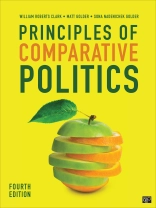Principles of Comparative Politics offers a view into the rich world of comparative inquiry, research, and scholarship. This groundbreaking text gives students meaningful insight into how cross-national comparison is actually conducted and why it matters. William R. Clark, Matt Golder, and Sona N. Golder walk us through the enduring questions that scholars grapple with, the issues about which consensus has started to emerge, and the tools comparativists use to analyze the complex and interesting problems at the heart of the field.
The thoroughly revised
Fourth Edition includes streamlined discussion and analysis of key topics and theories in the field.
Included with this title:
LMS Cartridge: Import this title′s instructor resources into your school′s learning management system (LMS) and save time.
Don′t use an LMS? You can still access all of the same online resources for this title via the password-protected Instructor Resource Site. Select the Resources tab on this page to learn more.
表中的内容
Preface
About the Authors
1. Introduction
2. What Is Science?
3. What Is Politics?
4. The Origins of the Modern State
5. Democracy and Dictatorship: Conceptualization and Measurement
6. The Economic Determinants of Democracy and Dictatorship
7. The Cultural Determinants of Democracy and Dictatorship
8. Democratic Transitions
9. Varieties of Dictatorship
10. Problems with Group Decision Making
11. Parliamentary, Presidential, and Semi-Presidential Democracies
12. Elections and Electoral Systems
13. Parties, Party Systems, and Party Competition
14. Institutional Veto Players
15. Consequences of Democratic Institutions
References
Index
关于作者
Sona Nadenichek Golder was previously assistant professor of political science at Florida State University. She is the author of The Logic of Pre-Electoral Coalition Formation, and has published articles in the British Journal of Political Science, Electoral Studies, and European Union Politics. She teaches courses on European politics, democracies and dictatorships, comparative institutions, game theory, and comparative politics at Florida State University and was a Mentor-in-Residence for the 2007 Empirical Implications of Theoretical Models Summer Program at UCLA .












